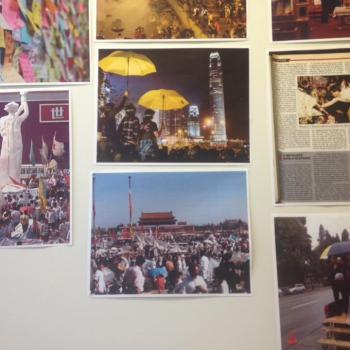![Matteo Ricci and Paul Xu Guangqi From La Chine d'Athanase Kirchere de la Compagnie de Jesus: illustre de plusieurs monuments tant sacres que profanes, Amsterdam, 1670. Plate facing p. 201 (Translation of: Athanasii Kircheri e Soc. Jesu China monumentis ... Amstelodami, 1667). Digital Scan from Villanova University, Falvey Memorial Library, Digital Library. - by Kircher, Athanasius, 1602-1680 (Ricci Guangqi 2.jpg) [CC BY-SA 3.0 (https://creativecommons.org/licenses/by-sa/3.0/deed.en)], via Digital Scan from Villanova University, Falvey Memorial Library, Digital Library](https://wp-media.patheos.com/blogs/sites/721/2016/08/Ricci_Guangqi_2-1-685x1024.jpg)
For some reason, it seems to be malfunctioning there. [FIXED! 5 pm, same day] I have posted it here again for your conveience.
On June 30, 2016, the Italian news outlet La Stampa put out an article written by Gianni Valente with the provocative headline, ‘Zen to Chinese Catholics: If agreement with China is signed, do not follow the Pope.’ ‘Zen,’ of course, refers not to Buddhism, but to the retired Roman Catholic bishop of Hong Kong, Joseph Cardinal Zen Ze-ken. While the article makes no mention of the word ‘schism’ in Zen’s call for Chinese Catholics to openly disagree with the Bishop of Rome, Cosmos the in Lost’s ever-energetic author Artur Rosman posted it on my Facebook timeline (as he is often wont to do) from a person who captioned it: ‘Retired Hong Kong Cardinal Calls for Schism.’ Rosman asked me if I wanted to comment, and I happily acquiesced, as this is a clear case where critical theorist Slavoj Žižek’s compliment that someone may be wrong but ‘not an idiot’ cannot be extended.
La Stampa’s article is basically a rehash of Cardinal Zen’s blog post from June 23, 2016. To Valente’s credit, most of the piece is a verbatim translation of the post, taking readers through Zen’s complaint about opportunists in the Vatican and in the People’s Republic of China (PRC) coming close to a deal and why the Vatican joining forces with the government-sponsored Catholic Church in China, the Chinese Patriotic Association (CPA), is such a bad idea. What gives off the bizarre impression that Zen is calling for schism from the Vatican is Valente’s interspersed commentary. ‘As is widely known,’ Valente writes in the second paragraph, ‘the elderly cardinal is not keen on the kind of Sino-Vatican pax that is apparently being witnessed in the exchanges taking place between Chinese officials their and Vatican counterparts [typo in original], confirmed by Pope Francis,’ resorting instead to losing ‘no time in pressuring Chinese Catholics to choose the path of silent dissociation.’ Later in the article, Valente contrasts Zen’s uncompromising attitude with John Paul II and Benedict XVI legitimizing some CPA bishops, putatively signaling that they ‘have always indicated dialogue, rather than contradiction, as the way to attempt to resolve problems face [sic] by Chinese Catholicism in its relationship with the civil authorities.’
To buy into Valente’s assertions would require readers to be completely ignorant of Zen’s actual record. If Zen has contributed anything to Sino-Vatican dialogue, it is that neither ‘Sino’ nor ‘Vatican’ are hazy, vague ideas that can be brought into a harmonious conversation. For Zen, both the PRC and the Holy See are complex institutions beholden to internal politicking. While it is thus easy to be seduced by the romantic idea of an exoticized oriental nation like China finally coming to a rapprochement with Rome, Zen calls for a measure of intellectual chastity. The PRC and the CPA are not coherent institutions; as Zen discussed as far back as 2011 with Fr Thomas Rosica at Salt and Light TV, the PRC government is not the CPA, who are not the people in the ‘open church.’ To say that Francis’s predecessors legitimized CPA bishops, then, is to fudge the facts. As historian Paul Mariani notes, it may be true that ‘Rome has cautiously let it be known that—over the years—it has reconciled with perhaps the great majority of “patriotic” bishops. For a long time, their names…were a closely held secret’ (p. 220). But what this means, Zen notes, is that these bishops are actually loyal to Rome but serving in the open church; this is not so much an acknowledgement of the legitimacy of the CPA, as it is an attempt to undermine it by suggesting that without Vatican approval, CPA bishops are still illegitimate.
Zen is not playing around with semantics, as there is some precedence for bishops of the open church expressing their secret (or sometimes, not-so-secret) loyalty to Rome. During the 1998 Asian Synod called by John Paul II in preparation for the Great Jubilee of 2000, Bishop John Tong Hon (now Cardinal Tong, and Zen’s successor in Hong Kong) recounted the story of an open-church bishop who organized a retreat for underground Catholics and their bishop. Because the government authorities refused to let the underground bishop preach, the open-church bishop gave a short homily and asked if there were any questions, so the underground bishop rose and asked a series of questions, after which the faithful realized that if all of his inquiries were worded as statements, they would compose a homily in its own right (Asian Synod, p. 118). These collaborations between persons in the open and underground churches – in ways that undermine instead of reinforce the legitimacy of the CPA – have come to a head in the contested ordination of Bishop Thomas Ma Daqin, a bishop ordained in Shanghai in 2012 with both Vatican and PRC approval. Immediately after his ordination, Ma denounced the CPA and was immediately put under house arrest, only recently coming out with a cryptic blog post possibly not even entirely authored by him saying that he had seen the error of being ‘confused by the outside world’ (read: the Holy See) and, with admiration for CPA bishop Aloysius Jin, was being reconciled to the CPA. In turn, Zen took to his blog to denounce the Vatican for failing to support Ma after all of his loyalty to Rome.
What this means in turn is that Zen also does not see ‘Rome’ as one coherent entity either. Reflecting on Benedict XVI’s pontificate, Zen distinguishes between the person of the Holy Father and the various Vatican curia offices that sometimes contradict and hamper the pope’s initiatives. On the one hand, Zen reiterates the praise he gave for Benedict XVI’s 2007 letter to Chinese Catholics at the time of its publication for its balance between the Catholic principles of the truth of communion and compassion for the human person having to live in actual historical reality. However, he blasts the Vatican curia for undermining Benedict XVI by following a path of ‘compromise’ with the PRC, keeping silent on the plight of Chinese Catholics who are loyal to Rome while trying to appease Beijing. As Zen continuously reiterates, this is a continuation of the 1970s Vatican policy of ostpolitik, seeking to pacify authoritarian regimes instead of openly denouncing them for violent repressions of their own people. As Zen suggests, neither John Paul II nor Benedict XVI went along with such ostpolitik measures for the most part, but the Holy Father is not the curia, and the curia is not the Holy Father. The problem, though, is that it seems to Zen that Francis is relying entirely on his curia on the question of China, tilting even him to an ostpolitik approach. Some tension, even if it was unhealthy and paralyzing during the times of Benedict XVI, is (for Zen) better than no tension.
Why would it be so bad to sign an agreement with the PRC to acknowledge the CPA? Is it only because it throws underground Chinese Catholics under the bus? Is it just because it would pit Francis against Benedict? Here, Zen shows himself to be the masterful church-state theorist that he is, a true child of the Second Vatican Council. What acknowledging the CPA would do, as Benedict XVI himself acknowledges in the 2007 letter to Chinese Catholics, is to subsume the church to the authority of the state. Not only does this fly wildly in the face of a Catholic sensibility more generally, but it runs completely contrary to Vatican II, where the Church is the ‘people of God’ and is in solidarity with ‘the joys and the hopes, the griefs and the anxieties of the men of this age, especially those who are poor or in any way afflicted.’ A people is not to be equated with a state, as John Paul II brilliantly showed in his support of the Polish Solidarity Movement as the legitimate voice of the Polish people, the Polish communist state be damned. Indeed, Zen explicitly references the widely acknowledged de facto leader of the Polish people in Communist Poland, Stefan Cardinal Wyszyński, in another discussion of China, driving home the Vatican II point that the state and people are not the same. To recognize the CPA would be close this gap between the people and the state, to say that the PRC is the Chinese people and that the CPA is Chinese Catholicism.
Far from calling for schism, then, Zen is trying to prevent it. After all, a church in the state’s pocket would no longer be catholic; it would become the propaganda machine of the state. There isn’t much need to speculate on what this might look like; one need only look, for example, to the Moscow Patriarchate propagating the ideologies of the ‘Russian World’ or to the embeddedness of the various churches of the Anglican Communion with authoritarian capitalist state regimes to get a taste of things to come. On this note, the PRC under the leadership of Xi Jinping certainly appears to have plans to advance a ‘Chinese Dream’ of material prosperity and a ‘One Belt, One Road’ regional strategy to integrate Central Asian economies with the PRC’s, among other international trade initiatives and attempts to develop a robust domestic economy. There is no doubt that the narrative of China, as well as other developing and even developed countries, lifting millions out of poverty is inspiring. But aside from throwing the poor under the bus – in a stunning rejection, no less, not only of Catholic social teaching, but of any Marxist tenets to stand for the materially oppressed – the demands of the people made to various states in the post-2008 occupy movements has been for the more existential good of human dignity and political agency in the face of capitalist corruption. Zen stood in critical solidarity with these movements too, advocating for Occupy Central with Love and Peace in Hong Kong in 2013-4, standing with students during the 2014 Umbrella Movement pro-democracy occupations, and criticizing the protesters for failing to consider political strategy by taking too long to wrap up their protest. The real schism that would be possible if the Vatican now conflates the state with the people would be to gain the state and to lose the people, for it would demonstrate that all the Vatican II talk about solidarity with the poor and afflicted is all just fluff because capital does all the good theology in Rome too.
Read this way, Cardinal Zen is not calling for schism from Rome. He is calling Francis to make good on his statements about a ‘poor Church for the poor,’ to be faithful to the spirit of Gaudium et spes as it is beautifully articulated in Laudato Si’ as ‘care for our common home,’ to double down over against his own curia with his own denunciation of ‘an economy that kills’ in Evangelii gaudium. Indeed, hearing the humble pope recently laud the PRC for its material prosperity is perhaps a sign that it is the wealthy who are winning in Rome. To position Zen as some kind of schismatic along the lines of the Society of St Pius X may be a strategic way to shut Zen up by locking him in the ideological prison of Euro-American conversations about the real lines of continuity between Benedict and Francis – discussions that seldom distinguish between people and state, pope and curia – but in waving the false flag of schism with Zen, the ostpolitik apologists are not so much preventing it, but proving themselves to authoritarian capitalist regimes everywhere as useful idiots.
POSTSCRIPT: Cardinal Zen has responded to Valente on his own blog here.
















